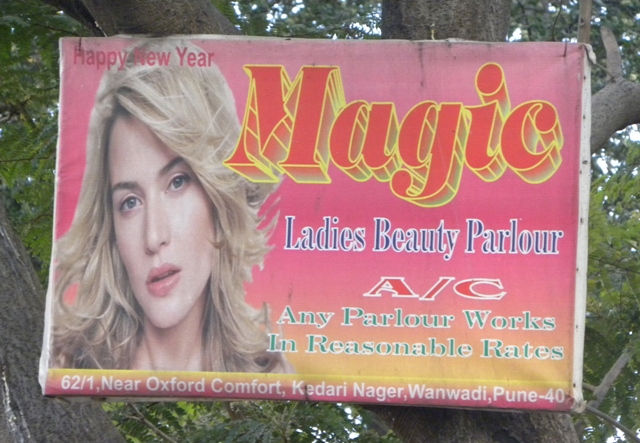Anyone who has visited a tourist spot in India may have had their photo taken with Indian tourists. Following a recent trip to Elephanta Island (a tourist site outside Bombay) I and my fellow international volunteers now appear in 10 Indian family photo albums. I’ve always found it a little bewildering to be asked to appear in a holiday snap just because I’m foreign.
Fellow volunteer Kassie after a family handed her their baby for a photo
My friend Elizabeth, who has been living in India for a couple of years, has started jokingly charging people 10 rupees to have their photo taken with her. People look momentarily surprised and then usually hand over the fee (which she then gives back). One time she successfully commanded a substantial sum of 100 rupees (about £1.30).
Elizabeth modelled free-of-charge on this occasion
Though the experience is fun it can make you feel a little objectified as some exotic creature. This experience has been useful as it has made me question how I make local people feel when I wield my own camera abroad.
I recently discovered that the experience of standing out from the crowd can be even more uncomfortable than a quick photo. On a couple of occasions I have found myself squirming slightly when invited to take a key role in events purely on the basis of perceived status.
On one occasion I was asked if I wanted to attend a ceremony at City of Child to welcome 50 nursing students. The students were undertaking a week’s serious voluntary work as part of the fantastic Indian National Service Scheme, which encourages students to see serving their nation as their first duty, in favour of ‘indulgence in intellectual luxury’.
The lovely nursing students from Ruby Hall Clinic getting ready to serve their nation
I entered the chapel with my camera all ready to take photos from the back. I was simultaneously mortified and honoured to be brought up to sit behind the alter with the head of the local village and a representative of City of Child. The pecking order became very apparent when I was second in line to light a candle and to receive a gift. My name was read out as an honoured guest in a speech, and afterwards I was invited to sit at the back of the chapel to drink chai while munching on crisps and Bombay mix with the head of the village.
The candles I helped light
The head of the village after I'd resumed my role as photographer
One aspect that made me feel uncomfortable was my status as a man. My position at the high table was above that of the (female) doctor who accompanied the nurses. And all present had to sit and wait for the men to finish their chai and crisps before proceedings could continue.
A coconut broken in traditional fashion on the threshold prior to the ceremony
Scissors prepared for cutting the ribbon
A few weeks ago I was privileged enough to be invited to a wedding on the edge of the Tadiwala slum. It was a large wedding of maybe 500 guests, a fantastic affair with lots of intriguing ceremonial action washed down with delicious curry. The strange thing was that I had never met anybody present before – including neither bride nor groom. (The bride’s mother works at DGS and had extended a kind invitation to the volunteers.)
In spite of feeling like a gatecrasher, I and two other international friends were invited onto stage after the ceremony to receive a beautiful yellow rose (sprinkled with glitter) and a traditional coconut. Nonetheless it was a hugely enjoyable event and it was a great privilege to be honoured in this way.
Perhaps weirder (though at this point I could feel it coming and was ready to get up from my seat) at an event to mark Women’s Day I was asked to go on stage to present a big bunch of flowers to a man (I still don’t know what for) before being presented with my own rose.
Why the fuss over Europeans? An Indian friend believes that despite 65 years of independence a colonial mindset still occasionally surfaces in India. Or perhaps we're just something a bit different. Who knows. I came to realise that my presence (and whatever I represented) clearly meant something to the people involved on each occasion. So I just got on with it, enjoyed the attention and had a good laugh about it afterwards.
Snow seekers in Manali
























































